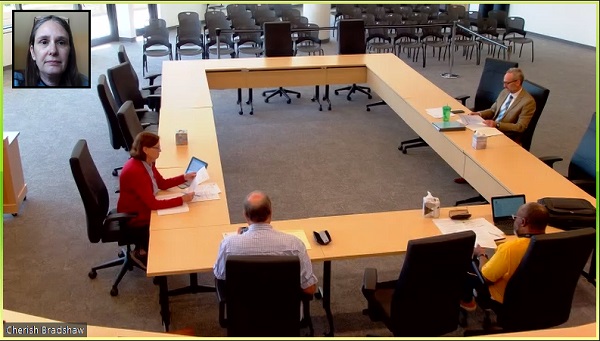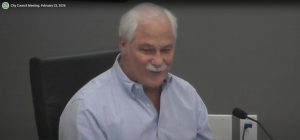Top city legislative priority in 2025: Funding for shelter that works
5 min read
The city’s intergovernmental relations committee looks ahead to the 2025 session. On Oct. 2, a summary of the council’s priorities.
Ethan Nelson (IGR manager): We’ll start out with number one: Long-term direct funding to cities for unhoused shelter.
[00:00:18] Gov. Kotek and the House Housing Committee‘s chair, Rep. Pam Marsh, convened the Sustainable Shelter Work Group, and it’s working on drafting a recommended framework for the 2025 session. Mayor Vinis is on the work group. Staff also is involved on both, there’s two subgroups; one is on how we fund, one is on what we fund. And their recommendations are going to be due at the end of the month. Our intention there is twofold: one, provide eligibility for the types of shelters that city of Eugene funds and that are found to be successful and innovative. And then two is to have direct funding to cities.
[00:01:02] Mayor Lucy Vinis: I think we’ve really been heard on the alternate shelter piece. That seems to be getting a good hearing.
[00:01:08] Ethan Nelson: I was in Salem and I made rounds to speak with different legislators, including Rep. Marsh, related to those two priorities. And the first one was pretty much supportive to say, ‘Yes, the eligibility criteria should be expanded,’ but if I kind of look at the crystal ball, I think we’ll be successful in the first one and probably need to continue to work with our county partner on the second.
[00:01:38] Councilor Randy Groves: Would there be any benefit of having a pre-conversation with Lane County before we do this?
[00:01:45] Ethan Nelson: Councilor Groves, we’ve been in conversations with Lane County for a number of years on this topic…
[00:01:51] Councilor Randy Groves: Would it be worthwhile to have elected-to-elected?
[00:01:53] Ethan Nelson: I would leave that to Sarah to give comment on it.
[00:01:57] Mayor Lucy Vinis: I mean, the context in which the county is functioning is HUD (federal Housing and Urban Development) dollars, right? And so they’re thinking of that continuum of care, a stream. And what we’re asking is, let’s get out of the HUD constraint because it’s not meeting the local need and address that. And that’s just sticky. It’s that bigger question of where the dollars come and how they flow through.
[00:02:17] I would prefer to get the money directly, but the second best would be to have the state really buy into the idea that these things need to be funded and that it’s going to be clear that it’s a line item and it goes to the county and the county has to disperse it to us. And I think that language will work, you know, as long as we get the money without the county sitting on it or pulling away or redirecting it in some way. As long as the state requirements for the county are very explicit about how that money is to be allocated, I think we can work with that. It’s getting the county to sort of accept that it can’t all go to this narrow HUD definition.
[00:02:56] Ethan Nelson: I would just add that one of the sticking points that we articulate in these meetings is that currently the state takes general fund or unrestricted dollars, and they put that into allocations towards shelter, but they apply HUD restrictions towards them.
We give the example: Say a city council with city general fund dollars usually doesn’t apply state requirements to how those dollars are utilized, because it’s much more appropriate for what the local needs are. We make that case.
[00:03:31] Number two: Seek funding for Clear Lake Road infrastructure, requesting what we requested last year. The total number of the project is still roughly $80 million, and it’s probably escalating. And then it’s also what’s the appetite? And so I would say that $8.5 million is pretty substantial for the state to give to one jurisdiction.
[00:03:57] Number three is support increased state investment in behavioral health systems. In mid-October, in two weeks’ time, and in early November, the city council will hold work sessions on behavioral health and substance use disorder systems and as we get through those work sessions better clarity from council, then we can put on into here.
[00:04:15] (Four.) Support increased protections related to threats to public officials. SB 92 from 2013: The act, from the summary of it, creates the crime of threatening a public official, punishes by maximum one year’s imprisonment, $6,250 fine, or both for first offense and maximum five years imprisonment, $125,000 fine, or both for subsequent offenses.
[00:04:39] Number five, secure authority for local governments to prohibit firearms in public buildings. And so Metro is leading this in 2025, where this is an existing policy position that the city has had in the past. And House Bill 2007 from 2023 gives a definition of what it would do.
[00:05:00] This would give the city council the ability to say in a public building, like council chambers or in the library, we would want to prohibit handguns. This element has been in firearm restriction bills in the past and it’s been negotiated out. Local governments got negotiated on out in previous versions.
[00:05:19] The state has that protection for state offices and state public buildings and also educational institutions. So, K-12, community colleges, University of Oregon has those protections. It would not be a mandatory, it would be that the local governing body would choose.
[00:05:35] Okay, and then number six: Improvements on the GEMT (ground emergency medical transportation). And so I just gave some more information on there, the update that I got from Deputy (Eugene Springfield Fire) Chief (Chris) Heppel was that he’s working with OFCA, the Oregon Fire Chiefs Association. They brought the issue to OHA (Oregon Health Authority), OHA has agreed with them, said yes, this is an issue in terms of the efficiency of the system. We can make changes that would improve it, but we can’t at the agency level. It needs to be a legislative change. And so I think OFCA is currently working on some bill language. And as I get more information on that, I will share it with you.
[00:06:13] And then the transportation package, that’s on the legislature’s agenda, and the big focus is sustainable funding for ODOT, for their maintenance and also large projects that were approved in 2017, but they haven’t been fully funded.
[00:06:34] Our main position is, and I’ve talked to other cities, that we maintain the 50-30-20 split of gas tax dollars, 50% to the state, 30% to the counties, 20% to the cities, and that any new revenue source that would be provided as a supplemental to that, maintain that same 50-30-20 split.
[00:06:57] John Q: The city’s top priority for the legislature: recognize the city’s innovative shelter solutions as eligible for ongoing state funding, then make sure the county passes that money along.




